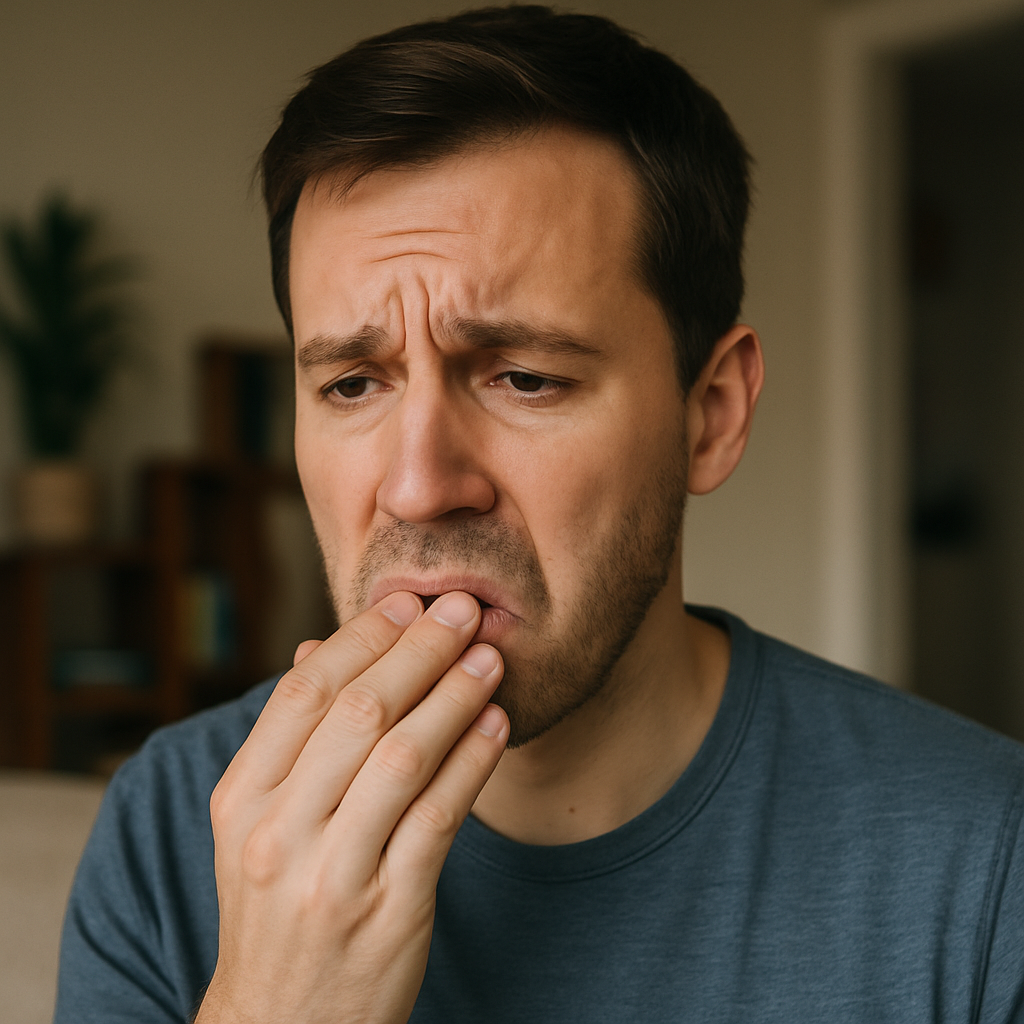How to Get Rid of Salty Taste in Mouth: Causes and Natural Remedies

If you’ve ever wondered how to get rid of salty taste in mouth, you’re not alone. Many people suddenly notice a salty sensation that lingers, and the first thought is often, is salty taste in mouth serious? This unexpected feeling can make daily life a little uncomfortable — after all, who wants their morning coffee or fresh fruit tasting oddly salty? Some experience sudden salty taste in mouth, while others deal with it for days, and naturally begin to ask why salty taste in mouth happens at all.
The truth is, there are multiple reasons. It can be something minor, like dehydration, or in some cases linked to an underlying health issue. Understanding the reason for salty taste in mouth is the first step toward relief. In this guide, we’ll walk through causes, natural remedies, and prevention strategies, so you’ll know exactly what to do if you’re feeling salty taste in mouth more often than you’d like.

How to Get Rid of Salty Taste in Mouth Naturally
Before running to a doctor, it’s worth trying simple natural approaches. Many times, the salty taste is harmless and can be managed at home.
Ayurvedic Remedies for Salty Taste in Mouth
According to Ayurveda, an ancient system of natural healing, taste imbalances often relate to issues in digestion or body fluid balance. For a salty taste, Ayurveda might suggest:
-
Oil pulling: Swishing sesame or coconut oil in your mouth for 10–15 minutes. It’s believed to help detoxify and restore balance to oral tissues.
-
Triphala powder rinse: This herbal blend may reduce inflammation and help cleanse the mouth.
-
Tulsi (holy basil) tea: Drinking tulsi tea can support digestion, which sometimes contributes to strange mouth tastes.
While these remedies may not be instant “cures,” many people find them helpful for resetting the palate.
Home Treatments to Restore Freshness
For those looking for quick fixes, a few home treatments can help:
-
Hydration: Dehydration is one of the most common salty taste in mouth causes and treatment options is as simple as drinking more water.
-
Oral hygiene check: Brushing twice daily and flossing regularly can clear bacteria buildup that sometimes leaves a salty flavor.
-
Saline rinse: Ironically, rinsing with a mild saline solution can reset taste buds and wash away irritants.
-
Chewing sugar-free gum: Stimulates saliva flow and helps neutralize odd tastes.
Some people even notice improvement just by cutting back on processed foods, which are loaded with hidden salts.

Don't wait or self medicate. Start chat with Doctor NOW
Is Salty Taste in Mouth Serious?
Here’s the thing: usually, it’s not dangerous. But sometimes, the salty taste in mouth causes and treatment go beyond home remedies. For example, chronic sinus infections, dry mouth (xerostomia), or certain medications can trigger it.
When to Seek Medical Advice
Seek medical attention if:
-
The salty taste is persistent for more than 2–3 weeks.
-
It’s accompanied by other symptoms (like dizziness, headaches, or bleeding gums).
-
You’re on new medication and notice the taste appearing suddenly.
Doctors can run simple checks to rule out serious conditions like nerve damage or illnesses.
Salty Taste in Mouth Causes and Treatment
Some common medical reasons include:
-
Post-nasal drip: Sinus fluid can leave a salty flavor.
-
Medication side effects: Antibiotics, antidepressants, and antihistamines may alter taste.
-
Vitamin deficiencies: Low levels of B12 or zinc sometimes change taste perception.
-
Illness: Certain conditions like Sjögren’s syndrome or GERD can explain what illness causes salty taste in mouth.
Treatment will depend on the root cause. If it’s dehydration, water is enough. If it’s an illness, addressing that condition usually solves the taste issue.
Sudden Salty Taste in Mouth: Common Reasons
So, why I feel salty taste in my mouth suddenly? The sudden onset often points to something short-term — maybe you ate salty snacks without realizing, or your body is signaling dehydration. Stress can also cause temporary imbalances that alter taste perception.
Why I Feel Salty Taste in My Mouth Suddenly
It could be as simple as dry mouth after a long sleep, or as tricky as hormonal changes affecting taste buds. People sometimes mistake it for dental issues too, since gum problems or cavities can also cause odd flavors.
What Is the Reason for Salty Taste in Mouth According to Ayurveda
Ayurveda might say that sudden salty taste links to aggravated Pitta dosha (fire element), meaning too much heat or imbalance in the body’s fluids. Remedies usually involve cooling foods, herbal teas, and reducing stress.
Prevention Tips to Avoid Salty Taste in Mouth
While treatments help once the problem appears, prevention is always better. If you often wonder what is the reason for salty taste in mouth, chances are a few daily habits might be at fault. Fixing them reduces the chance of it coming back.
-
Stay hydrated: Dehydration is the number one culprit. Aim for 8 glasses of water a day, more if you sweat or exercise a lot.
-
Cut back on processed foods: Packaged snacks, sauces, and even breads can hide huge amounts of sodium. Eating fresh foods keeps your taste buds balanced.
-
Practice good oral hygiene: Brushing twice daily, flossing, and using a gentle mouthwash keeps bacteria in check. Skipping floss may seem minor, but over time it causes plaque buildup, which can distort taste.
-
Quit smoking: Tobacco dries out the mouth and damages taste buds. Smokers often report odd flavors — salty, metallic, or bitter.
-
Check your medications: If you suddenly develop the problem after starting new pills, ask your doctor. Sometimes a dosage change or alternative drug is all it takes.
Also, regular dental checkups are not just about cavities. Dentists can spot gum disease or oral infections that contribute to a salty taste in mouth.
Conclusion
A salty taste in the mouth may feel strange or even worrying at first. But in most cases, it’s not something serious. Still, it’s important to ask yourself: is salty taste in mouth serious for me personally? That depends on duration, intensity, and whether it comes with other health symptoms.
We’ve explored Ayurvedic remedies, home treatments, and the common medical reasons for this condition. From dehydration to sinus problems, to even underlying illnesses — the salty taste in mouth causes and treatment vary widely. The good news is, for many people, the fix is simple: drink more water, improve oral care, and cut back on excess salt in food.
If you’re feeling salty taste in mouth for weeks or notice it happening suddenly without explanation, don’t ignore it. Consulting a doctor ensures you get to the root cause and treat it properly.
Your body communicates in subtle ways, and sometimes, something as small as an odd taste is its way of waving a flag. Don’t brush it off completely, but don’t panic either.
FAQs
How to treat sudden salty taste in mouth?
Start with the basics — drink plenty of water, rinse your mouth, and check oral hygiene. If it persists longer than 1–2 weeks, consult a healthcare provider to rule out infections or side effects of medication.
Can dehydration cause salty taste in mouth?
Yes, dehydration is one of the most common reasons. When the body lacks water, saliva becomes concentrated, leaving behind a salty or metallic taste.
What foods can help remove salty taste in mouth?
Fresh fruits like oranges, apples, and berries can refresh the palate. Crunchy vegetables (carrots, cucumbers) and herbs like mint also work well. Some people find chewing sugar-free gum or drinking green tea helps neutralize the taste.
Got any more questions?
Ask Ayurvedic doctor a question and get a consultation online on the problem of your concern in a free or paid mode.
More than 2,000 experienced doctors work and wait for your questions on our site and help users to solve their health problems every day.

